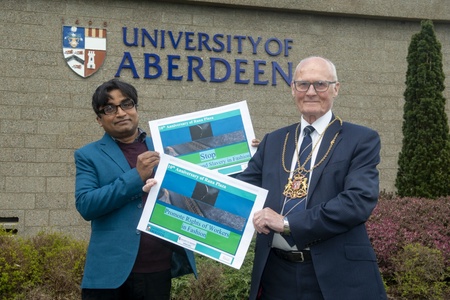On 24 April 2013 the Rana Plaza, an eight-storey building in Dhaka, the capital of Bangladesh, collapsed.
Home to five factories and 5,000 workers making garments for the global fashion clothing industry, the incident was the deadliest disaster in the history of the trade, resulting in the deaths of more than 1,100 workers and injuries to a further 2,500.
A decade on from the tragedy, researchers at the University of Aberdeen have presented the findings of recently completed research into the impact of global clothing retailers practices on Bangladeshi suppliers.
Delegates at yesterday’s event in Old Aberdeen heard from project lead Muhammad Azizul Islam, Professor in Sustainability Accounting and Transparency at the University of Aberdeen Business School; Professor Pamela Abbott, chair in Education and director of the Centre for Global Development; Professor Keith Bender, Director of Research at the Business School, Professor Shamima Haque of the University of Dundee Business School; and David Innes, chair of Aberdeen for a Fairer World. Aberdeen’s Lord Provost Councillor David Cameron also spoke at the event.
Researchers shared the findings of a survey of more than 1,000 Bangladeshi manufacturers which found large numbers of high street fashion brands were reported to be buying from factories facing rising costs, with nearly one in five struggling to pay the Bangladeshi minimum wage of £2.30 per day.
In total 90% of larger high street brands buying from four or more factories were reported as engaging in unfair purchasing practices in the survey carried out by the University and trade justice charity Transform Trade. Earlier research also found the Covid-19 pandemic exacerbated interrelated vulnerabilities in economic, job, food and housing security, as well as health and wellbeing, with women workers struggling to support themselves and their families.
It found that some employers refused to let workers return after lockdown. Most who did return said they had been forced to sign new contracts, losing access to benefits and protection they had previously accrued. The research also found an increase in intimidation and threats, physical and sexual violence, and restriction of movement.
“The Rana Plaza disaster thrust the subject of ethical fashion into the spotlight, with international calls for action over workers’ safety and human rights in the immediate aftermath,” said lead researcher Professor Islam. “Now, as we mark the 10th anniversary, we have to consider how much has actually changed for these workers.”
The event was jointly organised by the Business School and the Centre for Global Development.
Dr Abbott added: “The ready-made garment industry accounts for 85% of Bangladesh export income, with more than 12 million Bangladeshis dependent on the sector. Yet the unequal power dynamic between the suppliers and the buyers is putting workers at a real disadvantage.”
The Lord Provost of Aberdeen, Dr David Cameron, said: “I was honoured to be invited to attend and speak at the event. Sustainability and ethical trade are key components of Aberdeen City Council’s day to day functions whether it be our ambitions for a Net Zero city or individual school promoting fair trade pupils uniforms. I was delighted to be able to give some oversight on our work in this regard and share information and ideas with colleagues from other sectors.”
Mr Innes said: "Aberdeen for a Fairer World work with teachers, schools and community groups do promote justice and human rights. We are keen to find ways to amplify the issues raised at the event today and to campaign for fair and ethical trade across the sector."


